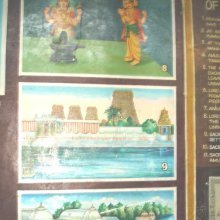Bathing, Bathed, Bath, Baṭh: 7 definitions
Introduction:
Bathing means something in Hinduism, Sanskrit. If you want to know the exact meaning, history, etymology or English translation of this term then check out the descriptions on this page. Add your comment or reference to a book if you want to contribute to this summary article.
Images (photo gallery)
(+8 more images available)
In Hinduism
Shaktism (Shakta philosophy)
Source: ORA: Amanaska (king of all yogas): (shaktism)Bathing rites are denoted by the Sanskrit term Snāna, according to the 17th century Kaulagajamardana (“crushing the Kaula elephant”) authored by Kāśīnātha or Kṛṣṇānandācala.—Accordingly, [as Īśvara said to Pārvatī]: “Listen, O Pārvatī, I shall give a critique of the Pāṣaṇḍas. Knowing this, a wise man is not defeated by them. [...] He who wears ash from the cremation ground and delights in wine and flesh; he who performs such [rites] as bathing (snāna) and the junctures for [mere] worldly rewards; and he who is the vilest [of them all,] having become a hater of Viṣṇu, destroys everything; [all of them] are called Pāṣaṇḍas. [Now,] my dear, hear about the Kāpālika. [...]”

Shakta (शाक्त, śākta) or Shaktism (śāktism) represents a tradition of Hinduism where the Goddess (Devi) is revered and worshipped. Shakta literature includes a range of scriptures, including various Agamas and Tantras, although its roots may be traced back to the Vedas.
Yoga (school of philosophy)
Source: ORA: Amanaska (king of all yogas): A Critical Edition and Annotated Translation by Jason BirchBathing (in the lake—symbolizing the no-mind state) is denoted by the Sanskrit term Snāta, according to the Amanaska Yoga treatise dealing with meditation, absorption, yogic powers and liberation.—Accordingly, as Īśvara says to Vāmadeva: “[...] [The Yogin] who has bathed (snāta) in the no-mind lake, which is free from the crocodiles of the senses and whose water is free from the wind and pure, obtains the supreme nectar. This natural, no-mind [state] has been taught thus [to Vāmadeva] directly by Śiva [himself] for the awakening of his disciples. However, [the no-mind state] is eternal, aspectless, undifferentiated, not expressible by speech and can only be experienced by oneself alone. [...]”.

Yoga is originally considered a branch of Hindu philosophy (astika), but both ancient and modern Yoga combine the physical, mental and spiritual. Yoga teaches various physical techniques also known as āsanas (postures), used for various purposes (eg., meditation, contemplation, relaxation).
Natyashastra (theatrics and dramaturgy)
Source: Shodhganga: Literary estimate of mudraraksasaBathing should be avoided on a stage (where a dramatic play is performed).—A Nāṭaka should contain pañcasandhis which indicate five successive stages of the drama. This criterion also is present in the Mudrārākṣasa. [...] In the Sāhityadarpaṇa, Viśvanātha gives a list of certain actions which should not be presented on the stage. [...] Likewise sleeping, bath, use of cosmetics and siege of the city are strictly prohibited in a Sanskrit nāṭaka

Natyashastra (नाट्यशास्त्र, nāṭyaśāstra) refers to both the ancient Indian tradition (shastra) of performing arts, (natya—theatrics, drama, dance, music), as well as the name of a Sanskrit work dealing with these subjects. It also teaches the rules for composing Dramatic plays (nataka), construction and performance of Theater, and Poetic works (kavya).
Languages of India and abroad
Sanskrit dictionary
Source: Cologne Digital Sanskrit Dictionaries: Shabda-Sagara Sanskrit-English DictionaryBaṭh (बठ्).—[baṭha] r. 1st cl. (baṭhati) To be large, powerful, or able: better also vaṭh .
Source: Cologne Digital Sanskrit Dictionaries: Monier-Williams Sanskrit-English DictionaryBaṭh (बठ्):—(also written vaṭh) [class] 1. [Parasmaipada] baṭhati, to be big or fat, [Dhātupāṭha ix, 46];
—to be powerful or able, [ib.]
Source: Cologne Digital Sanskrit Dictionaries: Yates Sanskrit-English DictionaryBaṭh (बठ्):—baṭhati 1. a. To be large, or able.
Sanskrit, also spelled संस्कृतम् (saṃskṛtam), is an ancient language of India commonly seen as the grandmother of the Indo-European language family (even English!). Closely allied with Prakrit and Pali, Sanskrit is more exhaustive in both grammar and terms and has the most extensive collection of literature in the world, greatly surpassing its sister-languages Greek and Latin.
See also (Relevant definitions)
Starts with: Bathing ritual.
Full-text (+2144): Snana, Majjana, Snata, Abhisheka, Snaniya, Snapita, Apasnata, Nahana, Snapana, Samaplava, Avagaha, Ritusnata, Apluta, Avaskandita, Dharagriha, Vath, Snanabhu, Apasnana, Parisheka, Samudragriha.
Relevant text
Search found 311 books and stories containing Bathing, Bathed, Bath, Baṭh; (plurals include: Bathings, Batheds, Baths, Baṭhs). You can also click to the full overview containing English textual excerpts. Below are direct links for the most relevant articles:
Vinaya (3): The Cullavagga (by T. W. Rhys Davids)
Cullavagga, Khandaka 10, Chapter 27 < [Khandaka 10 - On the Duties of Bhikkhunis]
Cullavagga, Khandaka 8, Chapter 8 < [Khandaka 8 - Regulations as to the Duties of the Bhikkhus towards one Another]
Cullavagga, Khandaka 5, Chapter 14 < [Khandaka 5 - On the Daily Life of the Bhikkhus]
Cosmetics, Costumes and Ornaments in Ancient India (by Remadevi. O.)
3.2. Medicinal Baths < [Chapter 1 - Cosmetics]
2.6. Dress for Bath < [Chapter 2 - Costumes]
2.10. Pharmaceutical use of Powders < [Chapter 1 - Cosmetics]
The Padma Purana (by N.A. Deshpande)
Chapter 117 - The Importance of Bathing in Kārtika < [Section 6 - Uttara-Khaṇḍa (Concluding Section)]
Chapter 125 - The Importance of Māgha As Told by Bhṛgu < [Section 6 - Uttara-Khaṇḍa (Concluding Section)]
Chapter 127 - The Release of a Demon < [Section 6 - Uttara-Khaṇḍa (Concluding Section)]
The Nilamata Purana (by Dr. Ved Kumari)
The Skanda Purana (by G. V. Tagare)
Chapter 177 - The Greatness of Bhūtīśvara (Bhūti-īśvara-tīrtha) < [Section 3 - Revā-khaṇḍa]
Chapter 100f - Yātrā Parikrama (pilgrimages) (6): Gaurī Yātrā < [Section 2 - Uttarārdha]
Chapter 27 - The Glory of Koṭitīrtha: Kṛṣṇa Atones for His Sin of Killing His Uncle < [Section 1 - Setu-māhātmya]
Trishashti Shalaka Purusha Caritra (by Helen M. Johnson)
Part 9: Reincarnation of Pūraṇa (third of Malli’s six former friends) < [Chapter VI - Śrī Mallināthacaritra]
Part 6: The birth-bath of Sambhava < [Chapter I - Sambhavajinacaritra]
Part 4: Birth-rites of Kunthu < [Chapter I - Śrī Kunthusvāmicaritra]
Related products
(+101 more products available)











